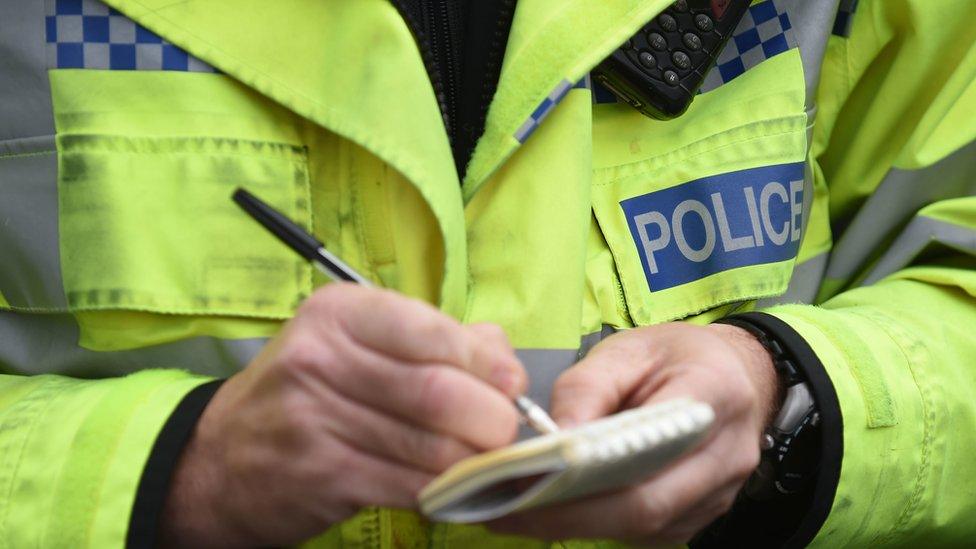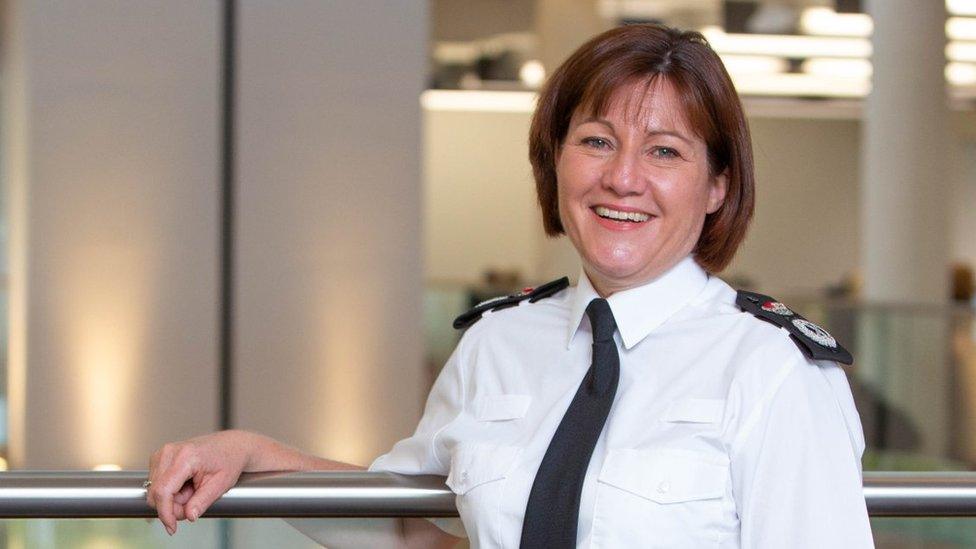Violent offences 'dealt with informally' by police forces
- Published

Violent offenders are being handed informal punishments by the police, despite guidance restricting their use to low-level offences.
Offences including burglary, sexual assault, violence and arson have led police to issue community resolutions, which do not involve going to court.
Critics said the orders were being used "contrary to their original purpose".
The National Police Chiefs' Council said community resolutions should not be used in the most serious cases.
About 112,000 offenders have been dealt with through community resolution orders each year since 2014, the BBC's Shared Data Unit found.
The orders represent about 3% of all crime outcomes, but there has been a slight decline in their use over that period.
From 2014 to 2018, they were issued for:
Some 2,500 sex offences including 27 rapes (Police forces said these disposals could relate to sexual activity between children including sexting)
Some 5,000 for possession of weapons, including knives and guns
Some 156,000 for violent offences against the person including 1,720 for cruelty to children
Some 151,000 for theft offences including 3,555 for burglaries and 309 for aggravated vehicle taking
'Police don't realise the impact'

Ben Matthews, 18, was the victim of an attack
County Durham student Ben Matthews, 18, was attacked by a prison guard. When the offence was committed, the attacker could have received a community resolution if he completed Durham Constabulary's Checkpoint scheme.
Since a legal change in April, the case will now be classed as a deferred prosecution, which also does not involve the attacker going to court.
Ben's mother, Jo Law, said: "We're petrified he'll walk away without a record.
"I would have liked him to go to court, for Ben's sake, and to show that they're taking it seriously.
"People who commit violent offences shouldn't be put on to such schemes, police don't realise the impact it's having on victims.
"I could have been going to Ben's funeral - I can't stop that going through my mind."
What is a community resolution?
Commonly issued for minor offences, a community resolution can involve restorative justice techniques, such as the offender apologising to the victim, paying compensation or repairing any damage caused.
Unlike a caution, a community resolution does not lead to a criminal record.
Under guidance, offenders should admit to the crime, while victims should agree before a community resolution is issued, though officers can use the disposal without consent with supervisor authorisation.
What do legal experts say?
Chris Henley QC, who chairs the Criminal Bar Association, said: "What is clear from the figures is that contrary to their original purpose and the very clear guidance given to the police, community resolutions are being used to deal with more and more serious offences. This shouldn't be happening.
"These cases should be resolved formally in a courtroom.
"It is unsurprising that offenders arrested for serious crime leap at the offer of an informal community resolution order."
Magistrates' Association chair John Bache JP said serious offences should be resolved in court.
"While we are aware there may be specific reasons why a community resolution was appropriate in some of the cases identified, the public must have confidence that serious offences are taken seriously - especially where there is an identifiable victim."
A spokesman for Victim Support said the orders were effective in dealing with low-level offences, but "wholly inappropriate" for more serious crimes.
What do police forces say?

Chief Constable Jo Farrell said her force puts victims first
Among the forces who provided context, Derbyshire Constabulary said seven incidents of child sexual exploitation concerned sexting between children.
Essex Police linked high use for weapons possession to a Stansted Airport operation targeting people entering the UK carrying banned items that may be legal elsewhere.
West Midlands Police, which issued six for rape of victims under-16, said disposals for sex offences could relate to activity between children, adding that they were only used with consent from victims or their parents.
Durham Constabulary Chief Constable Jo Farrell said quality assurance methods were used to "ensure that at all times, we have done the right thing for the victim".
National Police Chiefs' Council deputy chief constable Sara Glen said "community resolutions helped police handle low-level offending proportionately...[and] should not be used in the most serious cases".
She said "victims' wishes were central" to decision-making which would also be examined further by force scrutiny panels.
"We anticipate that the number of community resolutions used for indictable offences will further decrease...community resolutions for these few cases must be authorised by an officer of a rank not lower than Inspector and we conduct thematic reviews to ensure compliance," she said.

Michael Fisher with former Durham Constabulary Chief Constable Mike Barton
In 2015, a government report said out-of-court disposals, external had been inappropriately issued in up to 30% of cases.
But the report said the measures were effective if they allowed police to make "simple, swift and proportionate responses" to less serious crimes.
Teesside Cannabis Club founder Michael Fisher said community resolutions made sense for possession of cannabis for personal use.
He said: "They're good for under-25s who could otherwise carry around decisions made while young for the rest of their lives."
Scotland
In Scotland, police have used similar disposals for more than 41,000 offences since 2015.
Recorded Police Warnings were primarily issued for minor incidents such as urinating or drinking alcohol in public but 13,330 were disposals categorised as "other".
Supt Barry Blair, from Police Scotland, said they allowed officers to use discretion when dealing with minor offending and aimed to minimise police bureaucracy while maximising an officer's time on the street.
Northern Ireland
Police in Northern Ireland underwent training after community resolutions were issued against guidance for weapons possession.
Between 2015 and 2018, use of the disposal for the offence dropped from 6.4% to 0.7% after officers received "robust governance" and education.
Growing in use, the disposals make up 5% of all crime outcomes recorded since 2015-16 in Northern Ireland.

More about this story
The Shared Data Unit makes data journalism available to news organisations across the media industry, as part of a partnership between the BBC and the News Media Association.
For more information on methodology, click here, external. For the full dataset, click here., external Read more about the Shared Data Unit here.